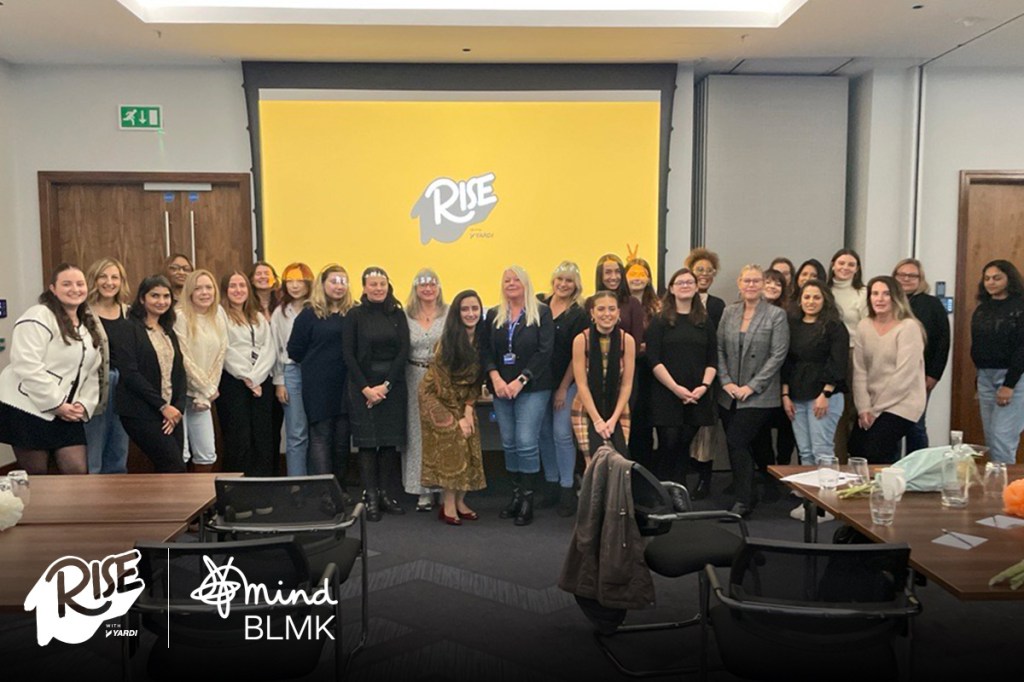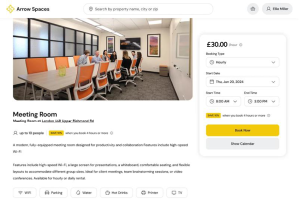Yardi RISE – Managing Mental Health for a Balanced Life
Yardi RISE, an internal initiative that empowers women in real estate, returns for its winter event in Milton Keynes. Featuring guest speaker Jeanette Skipsey, market development manager for Mind BLMK, the event delved into the subject of mental health. With over 15 years of experience working with Mind BLMK, Skipsey is passionate about developing and enhancing knowledge in the promotion of wellbeing. Conversations centred around the link between stress, anxiety and physical health. While highlighting strategies to effectively navigate and maintain mental well-being for a balanced life.
Recognising the Normality of Anxiety & Stress

In a world where 1 in 4 adults and 1 in 10 children suffer from a diagnosable mental disorder, the pressure of daily life can feel overwhelming. Skipsey started her discussion by emphasising the normality of suffering from mental health. She notes, “It’s not weakness and there’s no health without mental health.” Stress and anxiety are a natural response “hardwired into our genetics,” a mechanism that has evolved to help us navigate challenges. By acknowledging stress as a normal part of the human experience, we can destigmatise mental health conversations. Stating that a “third of all GP visits are stress-related,” underscores the general nature of this issue and the need for open dialogue.
“Sensitivity is in our genes – it’s predetermined by nature. When we feel anxious about things, our automatic nervous system works with our central nervous system. And that will go into what we call fight, flight or freeze. That’s a heightened state of stress…it’s normal in all of us.”
Therefore, Skipsey’s call to shift language away from the term “mental health problem” to more relatable terms, such as “stress” and “emotional well-being” is a practical step in encouraging discussions. This linguistic shift makes it easier for individuals to communicate their experiences, reducing the barriers/stigma surrounding seeking help and support.
The Links Between Physical & Mental Health
The intricate link between physical and mental health is a crucial concept that Skipsey highlighted. Recognising that “the mind and physical self are not separate, but rather work in synergy,” will allow individuals to adopt a holistic approach to their health and mental well-being. She notes that a minor physical ailment, “like a common cold,” can have cascading effects on mental processes, “impacting the mind and our capacity to think and make decisions,” but also influencing our mood. Skipsey stresses that these mental challenges can manifest into physical symptoms. “You will be more tired, or you will neglect sleep/nutrients” because of the constant, emotional worrying. Thus, “altering routines and daily habits.”
However, understanding this connection between physical and mental health will empower individuals to manage both aspects of their health proactively. By doing so, we can better navigate the obstacles life throws at us.
“As a therapist, we train our mind to stop and think and listen before it gets to the physical. But for most of us, because we don’t have that skill set, we only feel unwell…because we’re not engaging with our thoughts and feelings. So, it’s good every day to engage with how you feel and justify how you feel. Really start to reflect and listen to your inner voice.”
RISE: A Blueprint for Well-being
Skipsey goes on to demonstrate how the Yardi RISE approach can be a practical framework for supporting well-being. She pinpoints how it provides actionable steps to manage mental health effectively. By grasping the four pillars of RISE (Recognise, Inspire, Showcase and Empower), men and women can build resilience and achieve a balanced state of mind.
- Recognise: The first step involves acknowledging our “inner voices” and understanding that “anxiety is a normal part” of the human experience. It is essential for effective self-care to recognise when “stress becomes problematic” and “seeking professional help” when needed.
- Inspire: Sharing knowledge about mental health inspires a culture of “openness and understanding.” Helping to break the silence surrounding mental health challenges and creating a “supportive environment” where individuals feel comfortable/inspired to seek help.
- Showcase: The importance of showcasing well-being cannot be overstated. “Sharing our journey” and celebrating well-being achievements, no matter how small, contributes to changing the narrative around mental health. By “showcasing positive stories, we reduce the stigma surrounding mental illnesses” and promote a culture of acceptance.
- Empower: The core of Yardi RISE is empowerment. Taking “time for self-care, engaging in relaxation techniques and initiating conversations about mental health” contributes to personal and community empowerment. Empowerment is about fostering a culture where seeking help is a “sign of strength, not weakness.”
Journaling: A Tool for a Healthier Lifestyle
Skipsey ends her discussion by highlighting the important role tools such as “mood diary journals” have in supporting mental well-being. These journals provide a practical way for individuals to reflect on “their emotions, identify patterns and gain insights” into their mental state. Taking a few moments each day to assess and validate feelings, empowers individuals to make informed choices for their well-being.
Mood diary journals serve as a valuable tool in promoting self-awareness and understanding. By incorporating journaling into daily routines, individuals can actively engage in their mental health journey and build a sense of control over their emotions.
What are the benefits of Journaling?
During the second half of the event, Yardi Account Executive and a member of the RISE committee, Harriet Clark, engaged the group in a journaling activity – where we shared our feelings of the day. But before we set out to complete this task, Clark shared her insights on journaling and how this practise has been instrumental for her in cultivating a well-balanced mental state.
Key takeaways include:
“Journaling is whatever you want it to be.”
“It’s a way to process your feelings, process your emotions, keep track of how you were feeling during a certain period.”
“Journaling is a beautiful way to balance pros and cons, good and negative things in one’s day.”
“Life lessons and emotional challenges are endless – so, it can make it a bit more digestible for the mind, especially if you’ve experienced some event.”
“Journaling can be a nice way to reflect on your emotional journey and feel proud of yourself on how far you have come.”
About Mind BLMK
Mind BLMK works across communities to support positive mental health and wellbeing. Working closely with a range of partners, it offers many activities from its wellbeing centres and local venues to make a difference to the mental health and wellbeing of people in Bedfordshire, Luton and Milton Keynes. Mind BLMK aims to make sure that no-one has to face a mental health problem alone. For more information, visit mind-blmk.org.uk.
About Yardi RISE
Yardi RISE was created in 2022. It’s an internal event for women at Yardi to network, inspire and empower each other. For more information, visit Introducing Yardi RISE or use the hashtag, #RiseWithYardi on socials.
Follow Yardi Kube on LinkedIn for the latest news, customer stories and blog posts.




